
NiccolòPaganini was an Italian violinist and composer. He was the most celebrated violin virtuoso of his time, and left his mark as one of the pillars of modern violin technique. His 24 Caprices for Solo Violin Op. 1 are among the best known of his compositions and have served as an inspiration for many prominent composers.

Nastassja Aglaia Kinski is a German actress and former model who has appeared in more than 60 films in Europe and the United States. Her worldwide breakthrough was with Stay as You Are (1978). She then came to global prominence with her Golden Globe Award-winning performance as the title character in the Roman Polanski-directed film Tess (1979). Other films in which she acted include the Francis Ford Coppola musical romance film One from the Heart (1982), erotic horror film Cat People (1982) from Paul Schrader, and the Wim Wenders drama films Paris, Texas (1984) and Faraway, So Close! (1993). She also appeared in the biographical drama film An American Rhapsody (2001). She is the daughter of German actor Klaus Kinski.

Aguirre, the Wrath of God is a 1972 epic historical drama film produced, written and directed by Werner Herzog. Klaus Kinski stars in the title role of Spanish soldier Lope de Aguirre, who leads a group of conquistadores down the Amazon River in South America in search of the legendary city of gold, El Dorado. The accompanying soundtrack was composed and performed by kosmische musik band Popol Vuh. The film is an international co-production between West Germany and Mexico.

Klaus Kinski was a German actor. Equally renowned for his intense performance style and notorious for his volatile personality, he appeared in over 130 film roles in a career that spanned 40 years, from 1948 to 1988. He is best known for starring in five films directed by Werner Herzog from 1972 to 1987, who would later chronicle their tumultuous relationship in the documentary My Best Fiend.
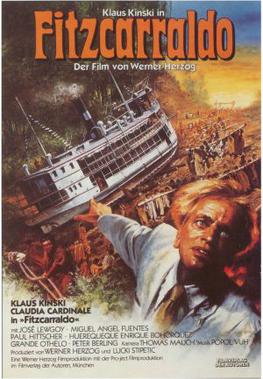
Fitzcarraldo is a 1982 West German epic adventure-drama film written, produced, and directed by Werner Herzog, and starring Klaus Kinski as would-be rubber baron Brian Sweeney Fitzgerald, an Irishman known in Peru as Fitzcarraldo, who is determined to transport a steamship over a steep hill to access a rich rubber territory in the Amazon basin. The character was inspired by Peruvian rubber baron Carlos Fitzcarrald, who once transported a disassembled steamboat over the Isthmus of Fitzcarrald.

Salvatore Accardo is an Italian violinist and conductor, who is known for his interpretations of the works of Niccolò Paganini.

Nosferatu the Vampyre is a 1979 gothic horror film written and directed by Werner Herzog. It is set primarily in 19th-century Wismar, Germany and Transylvania, and was conceived as a stylistic adaptation of Bram Stoker's 1897 novel Dracula, taking the title of F. W. Murnau's 1922 film Nosferatu: A Symphony of Horror. The picture stars Klaus Kinski as Count Dracula, Isabelle Adjani as Lucy Harker, Bruno Ganz as Jonathan Harker, and French artist-writer Roland Topor as Renfield. There are two different versions of the film, one in which the actors speak English, and one in which they speak German.
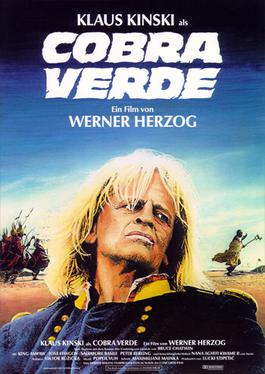
Cobra Verde is a 1987 German drama film directed by Werner Herzog and starring Klaus Kinski, in their fifth and final collaboration. Based upon Bruce Chatwin's 1980 novel The Viceroy of Ouidah, the film depicts the life of a fictional slave trader who travels to the West African kingdom of Dahomey. It was filmed on location in Ghana, Brazil, and Colombia.
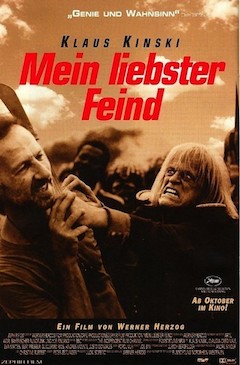
My Best Fiend is a 1999 German documentary film written and directed by Werner Herzog, about his tumultuous yet productive relationship with German actor Klaus Kinski. It was released on DVD in 2000 by Anchor Bay.

All I Need Is Love: A Memoir is the autobiography of the German actor Klaus Kinski first published 1975 in German under the title Ich bin so wild nach deinem Erdbeermund. The first translation into English was released in 1988, then soon withdrawn from publication. After the author's death, it was retranslated, retitled, and republished in 1996 as Kinski Uncut: The Autobiography of Klaus Kinski.
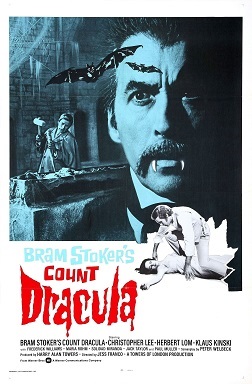
Count Dracula is a 1970 horror film directed and co-written by Jesús Franco, based on the novel Dracula by Bram Stoker. It stars Christopher Lee as Dracula, Herbert Lom as Van Helsing, and Klaus Kinski as Renfield, along with Fred Williams, Maria Rohm, Soledad Miranda, Paul Muller, and Jack Taylor.

Vampire in Venice, also known as Prince of the Night and Nosferatu in Venice is a 1988 Italian supernatural horror film directed by Augusto Caminito and an uncredited Klaus Kinski, and starring Kinski, Christopher Plummer, Donald Pleasence, and Barbara De Rossi. The story follows Professor Paris Catalano (Plummer), who travels to Venice following the trail of the last known appearance of Nosferatu (Kinski), who was seen at Carnival in 1786. Catalano learns through a séance that the vampire is seeking eternal death, and tries to put an end to its existence once and for all.
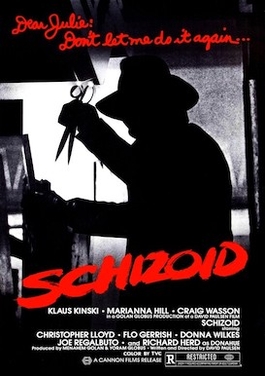
Schizoid is a 1980 American slasher film directed and written by David Paulsen, and starring Klaus Kinski, Marianna Hill, Craig Wasson, Christopher Lloyd, and Donna Wilkes. It follows a Los Angeles advice columnist who is subject to a series of threatening anonymous letters, while members of a group therapy she attends are being stalked and murdered by a killer armed with shearing scissors.

Woyzeck is a 1979 German drama film written, produced and directed by Werner Herzog and starring Klaus Kinski and Eva Mattes. It is an adaptation of the unfinished play Woyzeck by German dramatist Georg Büchner.
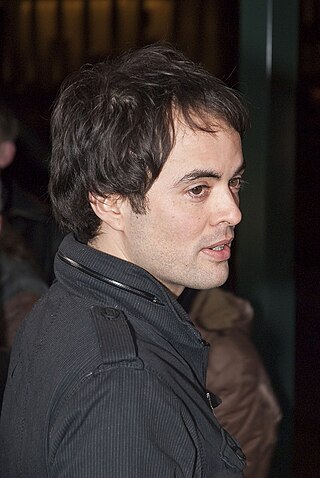
Nanhoï Nikolai Kinski is a French-American film actor, who has also done work in television and on stage. He was born in Paris, and grew up in California. Currently residing in Berlin, he has acted primarily in American and German films, and speaks English, German, and French. He is a citizen of both the U.S. and France.

Crawlspace is a 1986 American horror thriller film starring Klaus Kinski as Karl Guenther, the crazed son of a Nazi doctor obsessed with trapping young women and slowly torturing them to death, alongside Talia Balsam, Barbara Whinnery, and Tané McClure. It is written and directed by David Schmoeller, and later became infamous due to the on-set conflicts between Schmoeller and Kinski, with claims that producer Roberto Bessi attempted to have Kinski murdered due to his continued hostility towards the crew.
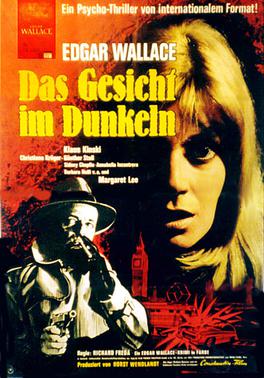
Double Face is a 1969 thriller film directed by Riccardo Freda and starring Klaus Kinski, Christiane Krüger and Annabella Incontrera. It is part of the series of Edgar Wallace adaptations made by Rialto Film.

The Magic Bow is a 1946 British musical film based on the life and loves of the Italian violinist and composer Niccolò Paganini. It was directed by Bernard Knowles. The film was entered into the 1946 Cannes Film Festival.

The Devil's Violinist is a 2013 film written and directed by Bernard Rose. It is based on the life story of the 19th-century Italian violinist and composer Niccolò Paganini. The film had its US premiere on 10 March 2014 at the Miami International Film Festival.
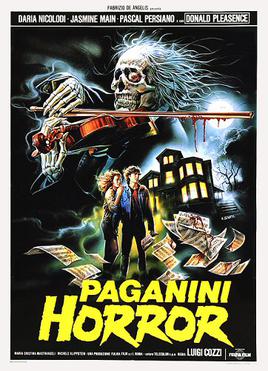
Paganini Horror is a 1989 Italian horror film directed by Luigi Cozzi. The film tells the story of a largely female rock band who acquires an unpublished score by composer Niccolò Paganini and decides to record it. When the band films a music video for the song in Paganini's ancient home, it awakens the spirit of the deceased composer and unlocks a portal to Hell.




















